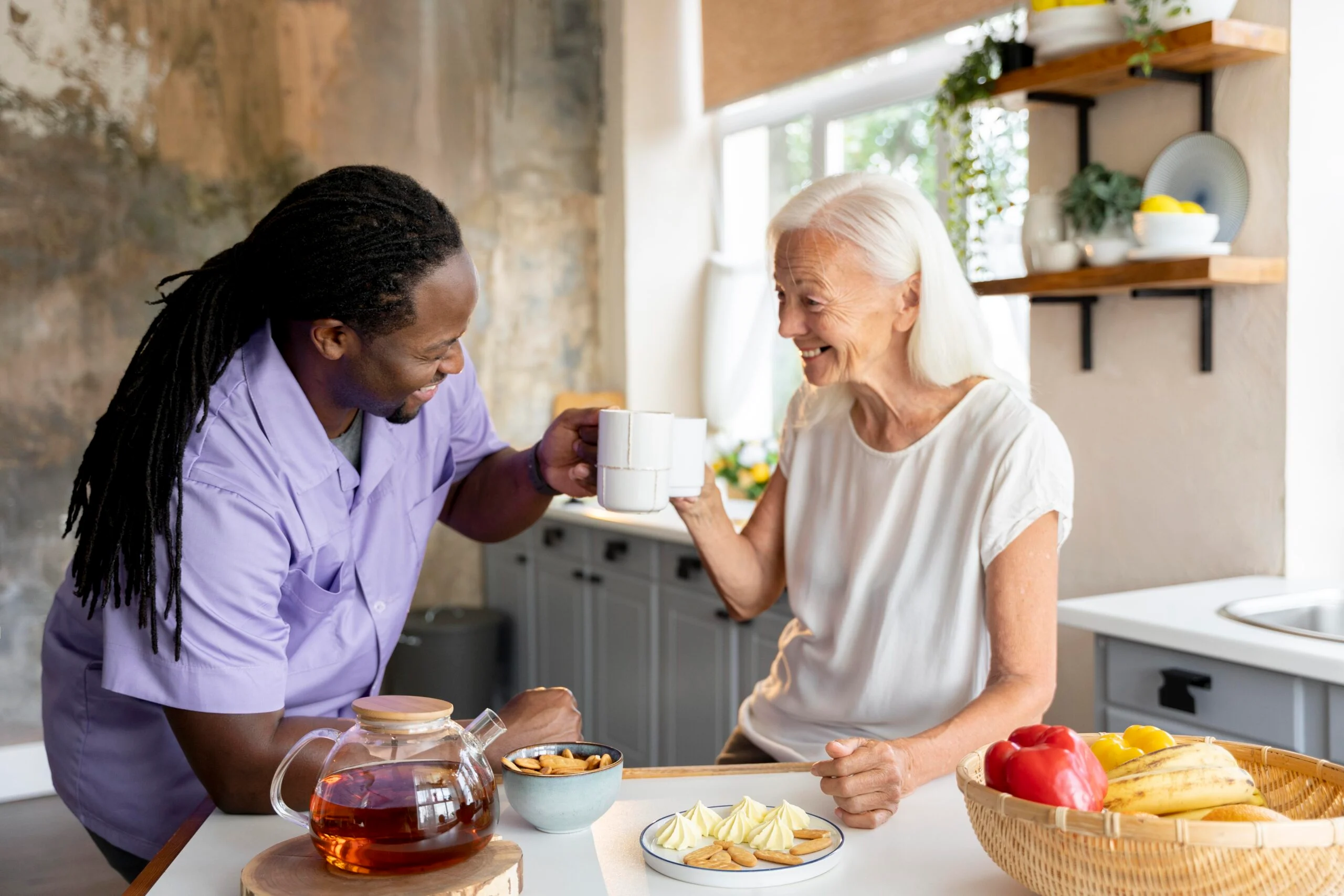This guide will help you identify important indicators and navigate conversations about care with sensitivity and respect.
Understanding the Signs That Signal a Need for Elder Care
The transition to needing assistance rarely happens overnight.
The need for elder care typically manifests across multiple areas of life. Rather than sudden changes, look for patterns that develop over time in the following key areas.
Physical Changes and Mobility Challenges
Physical changes often provide the clearest indication that additional support may be needed. Many families notice their loved ones struggling with movement and personal care tasks they once handled with ease.
You may observe:
- Difficulty rising from chairs or getting in and out of bed
- Unsteady gait or recent falls
- Struggling with car transfers (getting in and out of vehicles)
- Reluctance to use stairs or navigate familiar spaces
- Unexplained bruises or injuries
When you observe your loved one holding onto furniture while walking or noticing new bruises they can’t explain, this may indicate an increased risk of falling.
Mobility challenges frequently extend to transportation issues as well.
If your loved one has become anxious about driving or needs help getting in and out of vehicles, car assistance for elderly family members may be necessary.
Many seniors benefit from specialized car transfer aids for elderly individuals, allowing them to maintain independence while ensuring safety.
Changes in Personal Care and Household Management
A well-maintained home requires consistent attention and physical capability. When these begin to decline, the evidence often appears in the living environment.
Walk through your loved one’s home with an observant eye and notice any of the following signs:
- Noticeable changes in personal hygiene or grooming habits
- Wearing the same clothes repeatedly
- Difficulty managing medication schedules
- Unopened mail, unpaid bills, or financial confusion
- Spoiled food in the refrigerator
- Clutter or unusual messiness in a previously well-kept home
- Neglected home maintenance that creates safety hazards
Financial management challenges frequently emerge alongside household issues. Watch for:
- Unopened mail is accumulating on counters
- Late payment notices for previously well-managed bills
- Confusion about financial matters or unusual purchases
- Difficulty keeping track of medications or appointments
Creating a list of daily needs for elderly care can help you track these changes systematically and determine when intervention might be necessary.
More often than not, these signs suggest your loved one might benefit from having their daily needs for elderly care addressed by professional support.
Cognitive and Behavioral Changes

Cognitive changes can be subtle but significantly impact daily functioning and safety. Many families first notice memory inconsistencies during regular conversations.
Your loved one might repeat the same stories frequently without realizing it or struggle to follow complex conversations they previously managed with ease.
They might misplace important items like keys or wallets regularly or show confusion about familiar processes like operating the microwave.
More concerning cognitive signs include:
- Getting lost in familiar neighborhoods
- Missing important appointments
- Struggling to follow recipes they’ve made for years
- Making unusual financial decisions or falling victim to scams
- Showing poor judgment about safety matters
The Alzheimer’s Association notes that while some cognitive changes are normal with aging, consistent patterns of confusion, disorientation, or memory loss warrant professional evaluation.
Read more: 5 Ways Companion Care Supports Elderly with Dementia
Social Withdrawal and Emotional Changes
Our social connections directly impact quality of life, especially as we age. Many seniors requiring elder care begin to withdraw from activities and relationships they once enjoyed.
You might notice your loved one declining invitations they would previously have accepted or expressing anxiety about leaving home.
They might mention feeling lonely despite having opportunities for connection, or you might observe them becoming increasingly isolated.
When combined with other warning signs, social withdrawal often indicates the need for elderly companion care services that provide both practical assistance and meaningful human connection.
Watch for these emotional indicators:
- Expressions of persistent sadness or hopelessness
- Loss of interest in previously enjoyed activities
- Unusual irritability or mood swings
- Anxiety about previously routine activities
- Comments about feeling burdensome to others
Starting the Conversation About Elder Care

When you’ve identified concerning patterns, approaching the topic requires sensitivity and strategic timing.
Many families postpone these crucial conversations out of fear of hurting feelings or facing resistance.
Related: When Your Parents Refuse Help: Resistance to Companion Care
Choose The Right Moment
Timing significantly impacts how these conversations unfold.
Consider whether your loved one tends to be more receptive during morning hours or after a pleasant meal. Some families find that neutral settings outside the home create a more relaxed atmosphere for difficult conversations.
- Select a relaxed, private setting
- Avoid times when either of you feel rushed, tired, or stressed
- Consider including trusted family members who can provide support
Use a Collaborative and Positive Approach
The way you introduce the topic of elder care greatly influences how it’s received.
Instead of pointing out deficiencies, such as “You can’t manage on your own anymore”, focus on enhancing quality of life by saying something like “I’ve noticed housework seems more challenging lately. Would having help with cleaning give you more energy for things you enjoy?”.
- Start with open-ended questions about how they’re managing
- Express specific concerns without judgment
- Focus on maintaining independence rather than taking it away
- Present care as a way to enhance quality of life, not diminish autonomy
Position elder care as a tool for maintaining independence rather than removing it. Explain how professional support can help them continue living at home safely instead of requiring more restrictive care options.
When discussing specific elder care solutions, focus on the benefits they provide:
- Transportation assistance preserves social connections
- Meal preparation ensures proper nutrition
- Medication management prevents dangerous errors
- Companionship combats isolation and loneliness
- Overnight care for elderly relatives provides peace of mind
Listen Actively and Validate Concerns
Create space for your loved one to express their thoughts and feelings. Many seniors have understandable fears about losing autonomy or becoming a burden.
Response statements like “I understand why that concerns you” or “That’s a valid worry” help validate their feelings while keeping the conversation moving forward. Avoid dismissing concerns with phrases like “You’re overreacting” or “That won’t happen.”
- Allow your loved one to express fears and concerns
- Acknowledge emotions without dismissing them
- Respect their perspective, even if you disagree
Remember that these conversations typically need to happen multiple times. The first discussion plants the seed, while follow-up conversations allow for deeper exploration of options and concerns.
Finding The Perfect Elder Caregiver for Your Loved One
Once your loved one acknowledges the need for support, it’s important to ensure that the caregiver you select meets your concerns and your loved one’s preferences:
- Caregiver training and credentials
- Background checks and screening processes
- Range of services provided
- Availability of overnight care for elderly clients
- Flexibility to adapt as needs change
- Communication skills and cultural sensitivity
- Compatibility with your loved one’s personality
- Client testimonials and references
How Kizuna Can Help
At Kizuna, we understand that each family’s elder care journey is unique.
We take great care in matching each client with a caregiver whose personality, experience, and approach align with their needs.
Our carefully selected caregivers support seniors with daily activities, companionship, transportation, and specialized care while respecting their dignity and independence.
- Compassionate personal care assistance
- Reliable transportation and car assistance for elderly clients
- Medication reminders and health monitoring
- Nutritious meal preparation
- Light housekeeping and home safety maintenance
- Meaningful companionship and cognitive engagement
- Overnight care for elderly clients who need round-the-clock support
- Respite care for elderly family members needing temporary assistance
Together, we can navigate the elder care journey with confidence and peace of mind.



